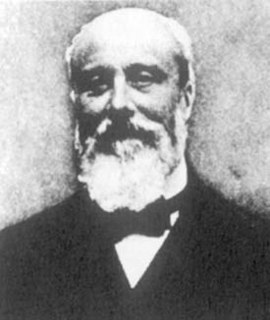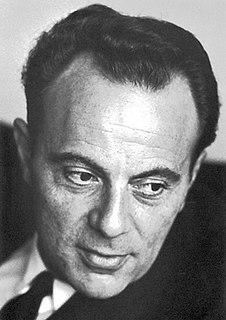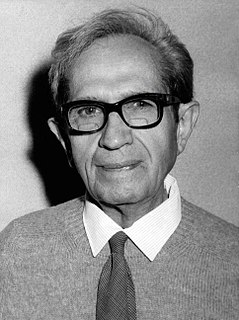A Quote by Ian Hacking
Philosophers of science constantly discuss theories and representation of reality, but say almost nothing about experiment, technology, or the use of knowledge to alter the world. This is odd, because 'experimental method' used to be just another name for scientific method.... I hope [to] initiate a Back-to-Bacon movement, in which we attend more seriously to experimental science. Experimentation has a life of its own.
Quote Topics
About
Almost
Alter
Another
Attend
Back
Bacon
Because
Constantly
Discuss
Experiment
Experimental
Experimental Science
Experimentation
Hope
Initiate
Just
Knowledge
Life
Method
More
Movement
Name
Nothing
Odd
Own
Reality
Representation
Say
Science
Scientific
Scientific Method
Seriously
Technology
Theories
Use
Use Of Knowledge
Used
Used To Be
Which
World
Related Quotes
Now these two questions Does there exist a material reality distinct from sensible appearances? and What is the nature of reality? do not have their source in experimental method, which is acquainted only with sensible appearances and can discover nothing beyond them. The resolution of these questions transcends the methods used by physics; it is the object of metaphysics. Therefore, if the aim of physical theories is to explain experimental laws, theoretical physics is not an autonomous science; it is subordinate to metaphysics.
When people think science and cooking, they have no idea that it's not correctly expressed. We're actually applying the scientific method. People think chemistry and physics are science, but the scientific method is something else.... It's the science that the world of cooking generates: science of butter; science of the croissant.
Science is nothing more than a method of inquiry. The method says an assertion is valid - and will be universally accepted - only if it can be reproduced by others, and thereby independently verified. The impersonal rigor of the method has produced enormously powerful results for 400 years. The scientific method is utterly apolitical. A truth in science is verifiable whether you are black or white, male or female, old or young. It’s verifiable whether you know the experimenter, or whether you don’t.
It seems to me that there is a good deal of ballyhoo about scientific method. I venture to think that the people who talk most about it are the people who do least about it. Scientific method is what working scientists do, not what other people or even they themselves may say about it. No working scientist, when he plans an experiment in the laboratory, asks himself whether he is being properly scientific, nor is he interested in whatever method he may be using as method.
Science, at its core, is simply a method of practical logic that tests hypotheses against experience. Scientism, by contrast, is the worldview and value system that insists that the questions the scientific method can answer are the most important questions human beings can ask, and that the picture of the world yielded by science is a better approximation to reality than any other.
The seers of ancient India had, in their experiments and efforts at spiritual training and the conquest of the body, perfected a discovery which in its importance to the future of human knowledge dwarfs the divinations of Newton and Galileo , even the discovery of the inductive and experimental method in Science was not more momentous.
The purpose of scientific method is to select a single truth from among many hypothetical truths. That, more than anything else, is what science is all about. But historically science has done exactly the opposite. Through multiplication upon multiplication of facts, information, theories and hypotheses, it is science itself that is leading mankind from single absolute truths to multiple indeterminate, relative ones.
The scientific method is the ultimate elegant explanation. It is the ultimate foundation for anything worthy of the name "explanation". It makes no sense to talk about explanations without having a process for deciding which are right and which are wrong, and in a broad sense that is what the scientific method is about. All of the other wonderful explanations celebrated here owe their origin and credibility to the process by which they are verified-the scientific method.
I love to read and teach experimental fiction but yes, neither this work nor my first novel is really that experimental. It uses some experimental techniques but in the end, I would not say that it is experimental. I'm not sure why. I do a lot of writing on my own, and I have always just written this way.
Contrary to what I once thought, scientific progress did not consist simply in observing, in accurately formulating experimental facts and drawing up a theory from them. It began with the invention of a possible world, or a fragment thereof, which was then compared by experimentation with the real world. And it was this constant dialogue between imagination and experiment that allowed one to form an increasingly fine-grained conception of what is called reality.
The fact that these scientific theories have a fine track record of successful prediction and explanation speaks for itself. (Which is not to say that I don't directly discuss the work of those philosophers who would disagree.) But even if we grant this, many will argue that scientific knowledge in humans, and, indeed, reflective knowledge in general, is quite different in kind from the knowledge we see in other animals.
But in practical affairs, particularly in politics, men are needed who combine human experience and interest in human relations with a knowledge of science and technology. Moreover, they must be men of action and not contemplation. I have the impression that no method of education can produce people with all the qualities required. I am haunted by the idea that this break in human civilization, caused by the discovery of the scientific method, may be irreparable.









































